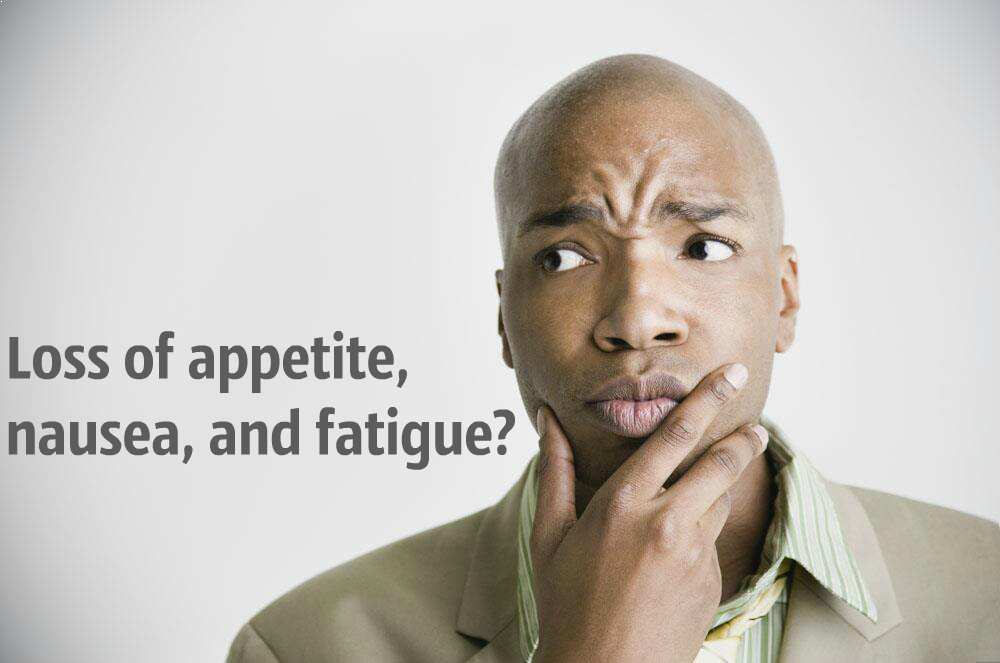What causes loss of appetite and fatigue
A good appetite has always been considered a sign of health and normal body functioning. The feeling of hunger is a natural phenomenon, which signals that a person needs to “recharge” and restore energy. Sometimes loss of appetite can be accompanied by fatigue and nausea. So what causes loss of appetite?

Source: Getty Images
Loss of appetite
Symptoms and signs:
- Weight loss
- Depression
- Loss of taste
Loss of appetite can be caused by various conditions and diseases. Some of the conditions may be temporary and reversible, for example, loss of appetite from the effects of medications. Some of the causes may be more serious, for example, cancer.
Of course, at least once in life, every person faces the problem of the loss of appetite. Our body is wise and capable of self-healing, so with a short-term loss of appetite, nothing terrible will happen. But the systematic refusals from food for long periods of time, may lead to extremely negative consequences for the body.
For people who are engaged in physical labor, loss of appetite may cause constant fatigue. It is difficult to imagine what the loss of appetite means for a nursing mother! So in all spheres of life of a person, loss of appetite will produce an adverse effect on the ability to work and live a normal life.
READ ALSO: Scent leaf and weight loss: Does it work?

Source: Getty Images
Loss of appetite causes
The lack of appetite causes can be divided into pathological (those that are the result of failures of of the digestive system in the body) and non-pathological (those that do not present a threat to the health and not require medical intervention).
Non-pathological causes of loss of appetite
In this case, the appetite is absent for 3-5 days (maximum for a week). After this period, the functioning of the body normalizes. Such episodes of loss of appetite are repeated no more than once a month; they do not cause severe weight loss and are not accompanied by nausea, weakness, fever, and other symptoms.
- Lack of appetite can be caused by external factors, for example, by very hot weather or an abrupt change of climatic zones. In warm weather, most people experience the loss of appetite. It is a normal reaction of an organism on heating. You may notice how during colder periods people eat more and gain weight, so in hot periods the reverse process occurs.
- Chronic fatigue. The body spends a large amount of energy on the food digestion, and in case of chronic fatigue, the organism subconsciously tries to save his energy by refusing from food.
- Stress. Any serious emotions, negative or positive, can have an adverse effect on your appetite. But some negative situations can lead to prolonged depression and chronic lack of appetite, so be careful with it.
- Disorders of the food timetable. If you often have your meal on the go, in a hurry or do not have it at all, it may also cause a loss of appetite.
- Premenstrual syndrome and the period of pregnancy. Before menstruation and during pregnancy, a woman’s body is under the influence of hormones, which can cause weakness, headaches, and cramps in the abdomen. Although, some women eat more in the same situation. Forecasting the influence of hormones on the female body is difficult.
- Bad habits. Smoking, alcohol or drug abuse can cause loss of appetite too. Many people even significantly gain weight after giving up smoking or drinking.

Source: Getty Images
READ ALSO: 10 health benefits of groundnut
Pathological causes of the loss of appetite
These are the reasons for the loss of interest in food that are associated with various diseases. These causes may present a threat to human health, so if you suspect or feel that your loss of appetite may be caused by one of these factors, you should immediately resort to visiting your doctor.
- The body fails to accept vitamins and nutritive elements. It can lead to a general depletion and even death.
- Infectious diseases and exacerbations of chronic ailments
- Endocrine disruption
- Any disorders of the digestive system
- Parasite infection (helminthiasis)
- Serious mental disorders (neurosis, anorexia)
- Allergic reactions
In this case, loss of appetite is usually accompanied by nausea, vomiting, dizziness, abdominal pain, etc.

What causes loss of appetite, nausea, and fatigue?
If the symptoms last no more than 4-5 days, after which they pass on their own, the reasons are not related to the presence of a disease. They also do not require special medical treatment.
Loss of appetite and tiredness accompanied by nausea can be caused by:
- Menstruation and premenstrual syndrome. It happens during hormonal adjustment and preparation for fertilization. The body adapts gradually to sudden jumps of progesterone and estrogen, and this adaptation can provoke nausea, weakness, and loss of appetite.
- Overeating (especially at night). Eating heavy meals before bedtime leads to nausea, which indicates the inability of the pancreas to produce the right amount of enzymes. Especially acute symptoms are manifested in the morning when nausea can come as vomiting. The vomiting may entail weakness and lack of appetite.
- Starvation. The uncontrolled refusal of food to lose those extra pounds can cause nausea and weakness. If food does not get into the stomach for a long time, the process of secretion of gastric juice breaks, causing irritation. Sometimes nausea occurs when a person has a strong feeling of hunger. At the same time, the lack of food provokes weakness and fatigue.
- Chronic fatigue syndrome. People who are continually experiencing fatigue and work too much may suffer from nausea, loss of appetite and tiredness. Workaholism is commendable but affects health. Lack of proper sleep affects the nervous system and brain and the mind can give the wrong commands to the whole body.

Source: Getty Images
READ ALSO: 10 health benefits of pawpaw
Other causes are associated with the presence of the disease in the body. In the majority of cases, medical care is required to eliminate them. This group includes the following:
- Dysbacteriosis. It is an intestinal disease, which disrupts the balance microorganisms involved in the digestive process. Poor digestion is problematic for the whole body since it is not possible to obtain from the food all the beneficial elements.
- Endocrine diseases. It is the lack of production of certain hormones, and it can provoke nausea, vomiting, weakness, and lack of appetite.
- Chronic diseases of the digestive system. Most often such symptoms are inherent. The causes are gastritis, gastric ulcer, and duodenal ulcer. Nausea, weakness, and lack of appetite are the first signs that the old diseases require particular attention and treatment.
- Mental disorders. If a person constantly experiences stress, depression may occur. This psycho-emotional state can lead to indifference to everything that happens around and is also accompanied by the lack of appetite, nausea and general weakness.
- Intoxication. In this case, vomiting and loss of appetite are the primary signs indicating the presence of pathogenic microflora in the human’s body.
- Cardiovascular diseases. Similar symptoms are familiar to people suffering from chronic arterial hypertension when the body has high blood pressure. Nausea can be manifested even after eating, and weakness is caused by the deterioration of blood vessels.
- Cancer or chemotherapy. In this situation, appetite decreases and fatigue and drowsiness may occur. Nausea and vomiting may occur, especially after chemotherapy.
- Infection. During the period of progressive elaboration of leukocyte cells, the body concentrates all its power on this process, allowing the patient to recover quickly. Lack of appetite, in this case, is a justified measure. Excessive amounts of toxins can provoke nausea and weakness, that can only be eliminated by maintaining sufficient water balance.
Remember, that prolonged refusal of food negatively influences a person’s health, subsequently provoking a complete disgust for any meal. Sharp weight loss often come with dizziness and insomnia. Entirely all processes in the body are disrupted. So you should be careful with loss of appetite problem but never panic beforehand. Be healthy and take care of yourself!
READ ALSO: Nigerian weight loss diet plan
Source: Legit.ng




